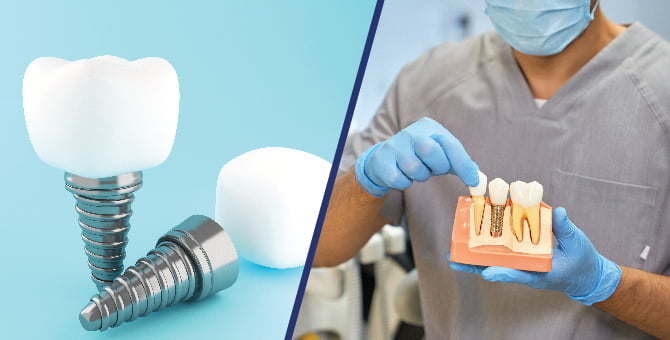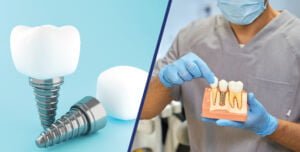

Dental implants are artificial tooth roots that are placed in the jawbone to support a dental prosthesis, such as a crown or denture. They work by fusing with the bone through a process called osseointegration, providing a stable and durable foundation for replacement teeth.
Dental implants offer more than just prosthetic teeth – they provide a complete tooth replacement solution. Unlike dentures or dental bridges, implants mimic natural teeth in appearance and functionality. Surgeons typically place artificial tooth roots, often made of titanium, into the jawbone. These implants establish a robust foundation for placing an artificial tooth, ensuring a natural-looking smile and restoring the ability to bite and chew with ease. Osseointegration, the process by which implants fuse with the jawbone, provides stability and durability for the artificial tooth.
Dental implants are typically made of highly biocompatible materials, such as titanium or zirconia. Titanium implants have been widely used in dentistry for decades due to their strength, durability, and compatibility with oral tissues. They have a proven track record of success and are frequently chosen for dental implant procedures. Zirconia implants, on the other hand, offer a metal-free alternative that is aesthetically appealing and may be preferable for patients with metal sensitivities. The choice of implant material depends on various factors, including the patient’s preferences, bone quality, and the dentist’s recommendation.
Before diving into the dental implant process, it is essential to understand that each patient’s journey is unique, and their treatment plan will be tailored to their specific needs. Generally, the process involves several key steps, starting with pre-implant planning, surgical implant placement, and post-surgical care. Pre-implant planning includes a comprehensive examination, treatment discussions, and diagnostic imaging to assess the patient’s oral health and determine the best course of action. The surgical procedure itself may involve bone grafting or sinus lifts to create a suitable environment for implant placement. After surgery, proper care and healing are crucial for successful osseointegration and the final restoration of the implant.
Pre-implant planning is a critical phase in dental implant therapy as it lays the foundation for a successful treatment outcome. It begins with a thorough examination of the patient’s dental and medical history, allowing the dentist to identify any risk factors or contraindications. Diagnostic imaging, such as X-rays or CT scans, provides detailed information about the jawbone structure, bone density, and the condition of neighboring teeth. This helps the dentist determine the optimal placement of the dental implants and customize the treatment plan accordingly.
Collaboration between the dental team and the patient is vital during the pre-implant planning process. The patient’s goals, budget, and oral care habits are taken into consideration to develop a treatment plan that best suits their needs. This ensures that the patient is well-informed about the expected outcomes, the number of implants required, and the estimated timeline of the treatment. It also allows the dentist to address any concerns or questions the patient may have, creating a trusting relationship between the dental provider and the patient.
By carefully evaluating the jawbone structure, the dentist can determine the need for bone grafting or other preparatory treatments before implant placement. This is crucial, as a strong and healthy jawbone provides a solid foundation for implant success. In some cases, advanced techniques such as sinus lifts may be required to create sufficient space for the implants in the upper jaw. These procedures help ensure the long-term stability and functionality of the implants.
The surgical procedure involved in dental implant placement is a precise and sophisticated process that requires expertise and careful planning. Here are some essential points to know about dental implant surgery:
Proper care and healing are vital after dental implant surgery to support osseointegration and ensure successful treatment outcomes. Here’s what patients can expect during the post-surgical care period:
Understanding the financial investment required for dental implants is essential. Factors influencing the cost include the type of implant, materials used, and any additional procedures such as bone grafting. The overall cost often reflects the quality and longevity of the artificial tooth root. While the initial investment may be higher than other options like removable dentures, dental implants are considered the next best thing to natural teeth, offering long-term benefits and enhancing overall oral health. Discussing the cost aspect with a general dentist specializing in implant dentistry can provide valuable insights tailored to individual needs.
The overall cost of dental implants is influenced by several factors. The number of implants needed, additional procedures like bone grafting, and the type of final restoration all play a role. Furthermore, the quality of materials used and the expertise of the dentist can impact the costs. It’s important to consider these factors when planning for dental implant therapy to ensure the best outcome both clinically and financially.
At Spark Family Dental, we understand that dental implants are a significant investment in your oral health. That’s why we offer flexible financing options to make them more accessible. With special payment plans and affordable monthly payments, we aim to ease the financial burden of dental implant treatment. Additionally, if you have insurance coverage, it may help offset some of the costs, making dental implants more affordable for you. We believe that everyone should have access to high-quality dental work, including dental implants, and our financing options reflect that commitment.
While dental implants offer numerous benefits, it’s important to be aware of potential risks and complications. These may include the risk of infection, damage to surrounding teeth or blood vessels, nerve damage, and sinus problems. Additionally, complications such as implant failure, bone loss around the implant, or failure of the implant to integrate with the jawbone can occur. Understanding and discussing these risks with your dentist is crucial for making an informed decision about your dental health.
During surgery, the risk of infection is minimized through the use of antibiotics. It’s common to experience swelling and discomfort after implant placement, but these are manageable. Proper bone growth and healing are crucial for the success of the surgery, as healthy gum tissue is essential for the proper placement of dental implants. Additionally, the risks associated with implant surgery are minimized by employing surgical skills and using the appropriate surgical techniques.
After a dental implant surgery, complications such as implant failure are rare with proper care. Regular dental visits are crucial for monitoring the healing process and implant osseointegration. Consumption of soft foods and supplements aids in the healing and recovery process post-surgery. Smoking increases the risk of complications and affects implant survival rates. Proper brushing and flossing reduce the risk of post-surgery complications.
Recovery after dental implant surgery involves following post-op care instructions to minimize discomfort and promote healing. Maintaining oral hygiene, avoiding hard foods, and attending follow-up appointments are crucial. It’s essential to understand the recovery time frame and adhere to prescribed medications. Once the implants are healed, regular dental check-ups will ensure their longevity and function. Proper oral care is vital for the success of your new artificial teeth. Spark Family Dental offers comprehensive post-surgical guidance, ensuring a smooth recovery and long-term maintenance of your dental implants.
After undergoing implant surgery, the healing process is vital for successful osseointegration of the tooth root with the jawbone. Follow-up appointments and careful monitoring play a significant role in ensuring a smooth recovery from dental implants. Proper oral care, including gentle brushing and flossing, is essential for aiding the healing and recovery process. In some cases, antibiotics and supplements may be recommended to facilitate the recovery. Regular dental check-ups post-surgery are crucial for monitoring the healing progress and maintaining the artificial teeth.
Proper care plays a crucial role in the maintenance of dental implants. Regular dental visits are essential for monitoring their condition. Good oral hygiene, including flossing, brushing, and using mouthwash, is vital for the upkeep of dental implants, contributing to their long-term success. Professional dental cleanings help preserve the health of both dental implants and natural teeth. At Spark Family Dental, patients receive comprehensive guidance on maintaining their dental implants, ensuring their continued well-being.
Offering advanced dental implant therapy options, Spark Family Dental ensures a natural and successful teeth replacement. The expertise in dental implant placement guarantees personalized treatment plans, providing comprehensive care from surgery to final prosthesis placement. With a focus on successful outcomes and patient satisfaction, Spark Family Dental stands out for its commitment to excellence in dental implant procedures.
When it comes to dental implant surgery, choosing the right provider is crucial. At Spark Family Dental, we prioritize proper care and placement of implants, using advanced therapy techniques for improved quality of life. Our personalized treatment plans and use of zygomatic implants ensure successful outcomes. Trust us for your dental implant needs.
In conclusion, dental implants offer a long-term solution for replacing missing teeth and restoring your smile. The process may involve pre-implant planning, surgical procedures, and post-surgical care, but the results are worth it. At Spark Family Dental, Dentist in Tracy CA, we understand the importance of a confident smile and offer top-quality dental implant services. Our experienced team ensures a smooth and comfortable procedure, and we provide financing options to make dental implants more accessible. With proper care and maintenance, your dental implants can last a lifetime. Don’t let missing teeth hold you back from a beautiful smile any longer.





Spark Family Dental is a Tracy-based local dentist providing quality care tailored to your needs. With experienced professionals and the latest technology, we can ensure you receive the best dental services possible. We accept PPO, and offer flexible payment plans through CareCredit.